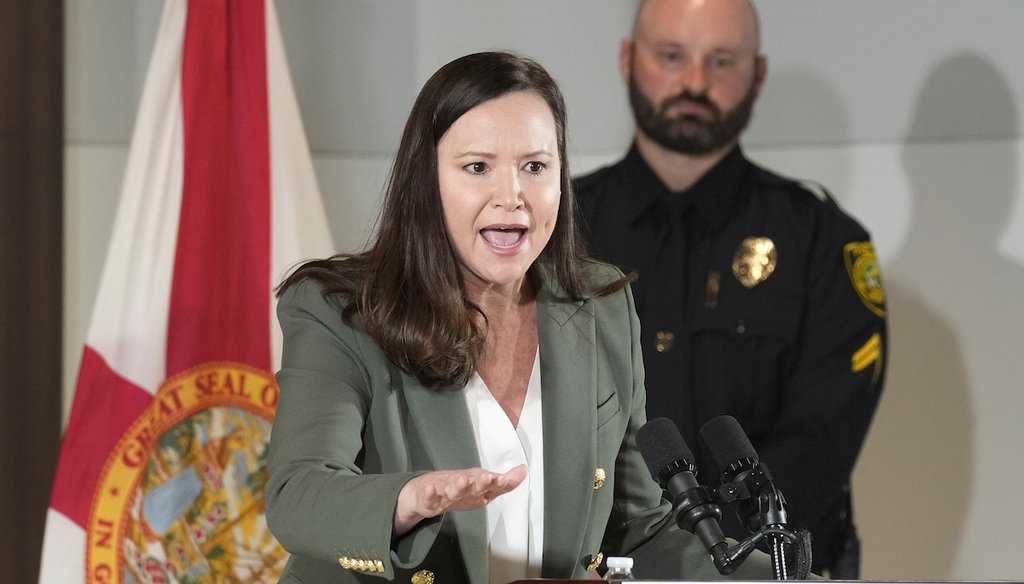Get PolitiFact in your inbox.

Florida Attorney General Ashley Moody speaks Jan. 26, 2023, in Miami. In October, she and other attorneys general sued Meta, Instagram and Facebook’s parent company, alleging the platforms “purposefully addict children and teens.” (AP)
If Your Time is short
- Amid rising teen anxiety and suicides, Florida lawmakers are proposing a solution: Stop them from using social media. House Bill 1 would bar kids younger than 16 from using social media; another bill would block them from accessing online pornography.
- Although teen anxiety and depression rates have risen along with social media’s prevalence, there is little data signaling that one is causing the other, researchers say.
- No spin, just facts you can trust. Here’s how PolitiFact does it.
TALLAHASSEE — Amid rising teen anxiety and suicides, Florida lawmakers are moving ahead with a solution: Stop them from using social media.
Under House Bill 1, kids under 16 would be prohibited from using social media. Another bill would block them from accessing online pornography.
To top legislators and other advocates, social media is akin to opioids and tobacco.
"Companies are knowingly putting forth a harmful product that is taking the lives of young people, and they’re doing nothing to stop it," House Speaker Paul Renner, R-Palm Coast, said Thursday.
But while the rate of teen anxiety and depression has risen along with the prevalence of social media, there is little data indicating that one is causing the other, researchers say.
Instead, various signs point to larger problems with American society. Kids have much less time to play than they did decades ago. Older adults are also suffering from high rates of suicide.
"I think there’s a misimpression about what’s going on," said Christopher Ferguson, a psychology professor at Stetson University who has studied the issue and written about it for Psychology Today.
"Everybody is experiencing a rise in depression and anxiety."
Under H.B. 1, social media companies like Facebook and TikTok would be required to hire a third-party company to verify the age of users. New users under 16 wouldn’t be allowed to join. Existing accounts would be deleted.
Those rules wouldn’t apply to apps that primarily focus on messaging.
H.B. 3 would restrict anyone under 18 from accessing online pornography and other "material harmful to minors," defined as what the average person would find "appeals to the prurient interest." The sites would also have to hire a company to do age verification.
The legislation has bipartisan support, including from conservative and Christian groups, and is one of Renner’s top priorities. On Thursday, the bills passed their first House committee with only one lawmaker voting against them.
The Senate has a similar bill, and the chamber’s president, state Sen. Kathleen Passidomo, R-Naples, said this week that there was "huge interest in the Senate to support those initiatives."
If it passes, Florida would join Utah, Arkansas and Mississippi in imposing age restrictions on social media sites. Even more states have created limits on online pornography. (Some states’ social media and pornography bills have been blocked by federal judges on grounds they violated minors’ right to free speech.)
The legislation is in response to dramatic increases in suicide rates among teens and depression among teen girls in particular since 2010. The timing has led many to tie the increases to smartphones and social media. The iPhone was released in 2007.
Studies have also linked longer social media use to worse mental health. U.S. Surgeon General Vivek Murthy cited that statistic when he urged parents and policymakers last year to take action to better understand the issue.
"You see a very direct correlation — not just in this country but across the globe and everywhere where social media is available — in a devastating, devastating effect on the mental health and well-being of our children," Renner said Thursday.
Renner and other lawmakers cited social media companies’ desire to keep young people on their platforms. Reporters for The Wall Street Journal in 2021 uncovered slides from researchers inside Instagram who acknowledged that teen girls who felt bad about their bodies felt worse while using the platform.
"We make body image issues worse for one in three teen girls," one slide stated, according to The Wall Street Journal.
In October, Florida Attorney General Ashley Moody and dozens of other attorneys general sued Meta, the parent company of Instagram and Facebook, alleging the platforms "purposefully addict children and teens."
But the data is not nearly as conclusive as advocates for social media limits state.
"Using social media is not inherently beneficial or harmful to young people," the American Psychological Association concluded after reviewing the studies.
The association wrote that the effects of social media depend on what teens do online, their preexisting strengths or vulnerabilities and how they grew up.
Researchers say that while there might be a correlation between social media and mental health, it doesn’t mean one is causing the other. Ferguson called the relationship an "ecological fallacy," when two unrelated things appear to correlate, such as the known correlation between the number of people who drown in swimming pools and the number of movies Nicolas Cage stars in each year.
Other evidence indicates that social media is not the problem. Social media is popular worldwide, yet Europeans, for example, did not see a rise in suicides. Suicides among teens also fall during the summer, when they’re out of school.
Instead, Ferguson and other researchers believe other factors are driving the mental health crisis.
Peter Gray, a research professor at Boston College who has written extensively on the topic, notes that Americans’ largest rise in suicides peaked in the mid-1990s, before the internet. Rates fell until the last decade, when they again reached 1990s levels.
"The people who talk about social media being the problem are ignoring that," Gray said.
Gray notes that American kids’ amount of play — unstructured time away from adults — has declined markedly over the last several decades, while rates of depression and anxiety have increased. He co-founded the advocacy group Let Grow, which encourages more freedom for children.
Unsupervised time away from parents allows kids to learn to be self-sufficient and to learn how to deal with stress, Gray said. But kids today have much more of their time consumed by homework, adult-directed activities and a hyperfocus (for some parents) on getting their kids into elite colleges. Those have robbed kids of valuable time for themselves and their peers, he said.
"The opposite of play is not work. The opposite is depression," he said.
Teens have reported that social media is one of the few places where teens can speak to their friends away from their parents, he said.
"What I’m seeing is a movement to deprive young people of yet one more freedom," Gray said.
Renner did not disagree with the importance of play and mental health, and he noted that lawmakers last year pushed to give high school students later start times to help with sleep. Doing away with social media, he said, would give kids more time for real-world interactions.
Our Sources
Please see sources linked in story.



















